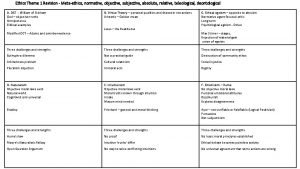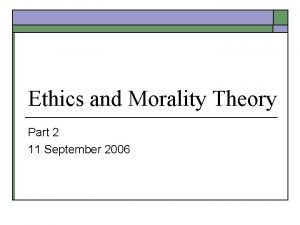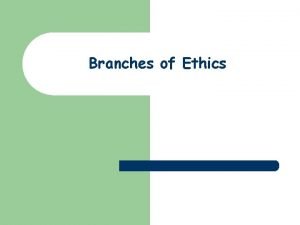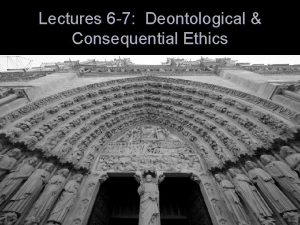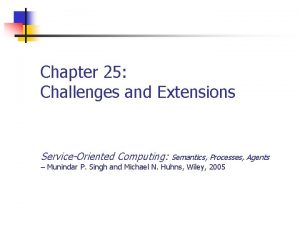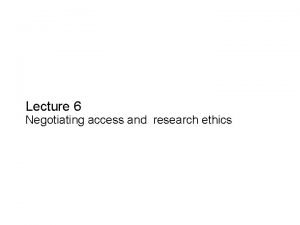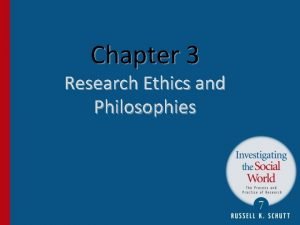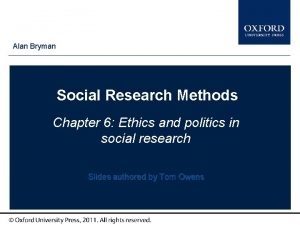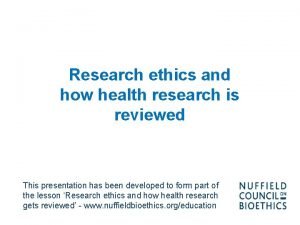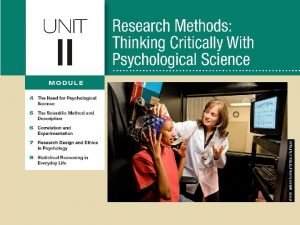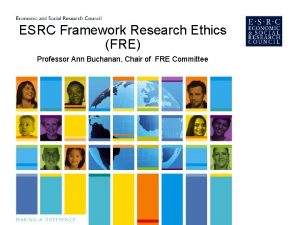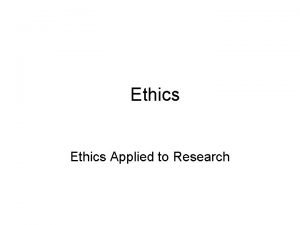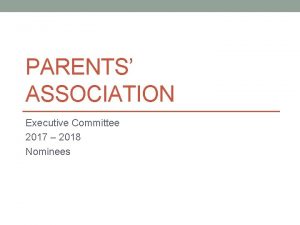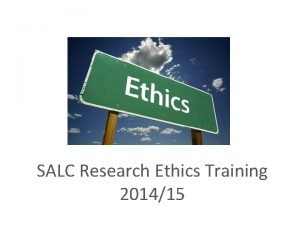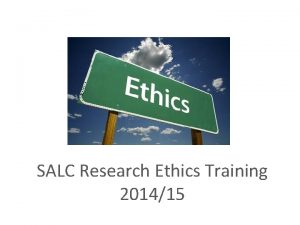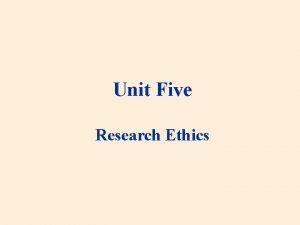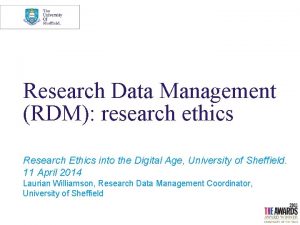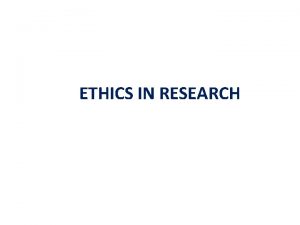SALC Research Ethics training 201617 Dr Jenny Hughes











































- Slides: 43

SALC Research Ethics training (2016/17) Dr Jenny Hughes, Chair – SALC Ethics Committee

Aims of today: • To increase awareness of research ethics principles • To encourage connections between your research projects and internationally recognised principles of research ethics • To offer guidance on School and University research ethics procedures

‘Research ethics is a world-wide set of principles governing the way any research involving interaction between the researcher and other humans or human tissue or data relating to humans, is designed, managed and conducted. In preparing a research project, the dignity, rights, safety and well-being of human participants must at all times be considered, respected and safeguarded’ University of Manchester Research Ethics Committee (UREC)

All projects conducted by University staff or students that involve human participants in a way that might harm, disturb or upset them (however slight the possibility) or where they can be deemed to be in a vulnerable or disadvantageous situation, must receive approval from a recognised research ethics committee. UREC

An ethics committee will assess whether: • the research is justified, i. e. is the research likely to add to the existing knowledge base; • it is of sufficient standard - including whether the researchers are qualified to carry out the roles proposed; • the risk it poses to participants is outweighed by the potential benefits of the research? ; • the research appears to comply with all statutory and other guidance; • data management and handling appears to comply with the relevant legislation; • financial arrangements appear sound.

Autonomy Beneficence Non-maleficence Confidentiality Integrity

In practice - What is the research and why is it important? Who is involved? What are you asking people to do? What are the ethical issues involved? How will you manage these?

Nuts and bolts Applying for ethical approval

Steps in the process … 1. Develop research proposal (with supervisor, if appropriate) – research questions, rationale, significance, who is going to be involved and how? Ethical issues? 2. Decide - what level of review do I need? 3. Complete an application via the University’s online system, appropriate to the level of review required (‘Ethical Review Manager’ - ERM) 4. Submit for review – to supervisor, School or UREC – depending on level of risk

What level of review do I need? • Low risk – reviewed by supervisor/tutor • Medium risk – review by School Research Ethics Committee • High risk – reviewed by University Research Ethics Committee NOTE – ALL STAFF APPLICATIONS ARE REVIEWED BY THE UNIVERSITY RESEARCH ETHICS COMMITTEE, REGARDLESS OF LEVEL OF RISK

High risk: The research focuses on groups within society in need of special support, is carried out in an unstable or volatile setting, involves nonstandard methodologies or approaches, presents risks to the personal safety of the researcher or research participant beyond what is normal in the setting, or where there is a possibility the research may be distressing to the researcher or research participant in one or more ways. High risk applications are reviewed by the University Research Ethics Committee (UREC) after initial screening at School level.

Example 1: Why would this research project need to be assessed by UREC? Texts of 'refugee-ness' (MA Dissertation) The research explores how contemporary understandings of the ‘refugee experience’ are produced by a range of circulating discourses. It compares the construction of the refugee experience in government policy and procedural discourse (via the analysis of legislation and procedural texts produced by government agencies), fictional narratives (in literature and poetry), and first-hand narratives gained via interviews with refugees in Manchester. The researcher intends to carry out in-depth narrative interviews with up to 10 asylum seekers currently being supported by Refugee Action as part of the research.

Example 2: Why would this research project need to be assessed by UREC? Performance in a place of war (Ph. D project) Youth music networks in the Palestinian Territories: the research explores a network of young musicians in the Palestinian Territories, documenting and understanding how musicians are using independent music to confront and counter narratives of war in communities. The researcher intends to carry out an ethnographic study of the network, spending up to 6 months in the Palestinian Territories and engaging in interviews and observations of their practice.

Medium risk The research engages adults and children (in an accredited setting such as a cultural institution, school or youth club and accompanied by a carer or professional with a duty of care), follows standard procedures and established research methodologies, is carried out in a public setting that does not present risks to the researcher or research participants beyond what is normal in that setting, and does not require research participants to provide personal and sensitive information likely to lead to significant levels of distress (the research topics are either not contentious or sensitive, or a reasonable person would agree the topic is of legitimate interest and may result in distress in rare instances). Medium risk applications are reviewed at School level.

Example 3: Why would this research project need to be assessed by the SALC Ethics Committee? Women and liberation theology in India (Ph. D project) The research explores attitudes to women within liberation theology in India. 20 scholars in liberation theology working at reputable religious and educational sites across India, known for their work in this area, are invited to take part in recorded interviews exploring how contextual realities like caste, class, gender, and rights have influenced attitudes to women, and how new theoretical insights can help develop the recognition of women’s rights in India.

Low risk The research engages healthy adults or children (in an accredited setting such as a cultural institution, school or youth club and accompanied by a carer or professional with a duty of care), who are able to give informed consent in a way that accords with accepted practice. The research follows standard procedures and established research methodologies, is carried out online or in a public setting that does not present risks to the researcher or research participants beyond what is normal in that setting, and does not require research participants to provide personal and sensitive information likely to compromise them, or to lead to distress (the research topics are not contentious or sensitive, such as asking about religious beliefs, sexual preferences, political views or illegal activities, or a reasonable person would agree the topic may only result in distress in extremely rare instances). Student projects deemed to be of low ethical risk require only the approval of the supervisor, but still need to be submitted via ERM.

Is my research low or medium risk? Low risk research, typically – • Does not focus on contentious or sensitive topics • Does not involve collection of personal or sensitive data • Focuses on professional practice/professional roles • Takes place within normal working hours and in a public setting • Does not involve the collection of photographs or videos of participants

Example 4: How does this comply with the low ethics risk guidelines? Kinaesthetic learning in the museum (MA Dissertation) The research explores a new approach to kinaesthetic learning tested out in collaboration with education teams at three museums. The researcher observes 15 groups of parents and children taking part in a 20 -minute creative object-handling session in 3 museums. The researcher carries out 10 -minute interviews following the session with parents and children asking for their reflections on the experience. Children are also asked to draw a picture that shows what they were thinking about and feeling during the session.

Exercise: What risk level is your research? Discuss with your neighbour: • Your research proposal • whether the questions and topics you are exploring are contentious or sensitive • whether you will need to involve human subjects who may be from vulnerable groups • the settings and methods of your research • the potential risks to you as researcher Is the category: HIGH, MEDIUM, LOW?

If you are in any doubt about the level of risk, please email James Mawdesley at salc. ethics@manchester. ac. uk

The application process

ALL applications are now made via the ‘Ethical Review Manager’ (ERM) – the University’s new online system for processing applications https: //submissionethicalreview. manchester. ac. uk (University log in required)



Selecting ‘University Research Ethics Committee Review’ will take you to the UREC form (questions E 1 – 53): • Research question • Academic justification • Details of what you are going to do – interviews, focus groups, questionnaires, other • Numbers of participants and recruitment processes • Key questions (E 11 and E 12) – ‘What do you consider to be the main ethical issues which may arise with the proposed study? ’ & ‘What steps will be taken to address the issues raised in the question above? ’ • Procedures for informed consent • Risks and safeguards • Data management • Reporting and dissemination • Conflict of interest/funding

For low/medium risk projects, select ‘Division/School Review’ (at A. 5) - this will take you to general and insurance questions. Under D 5. 2 – which asks for your School/Division – select ‘School of Arts, Languages and Cultures’

SALC ethics form (questions J 1 – 87)

Low risk template Research question Academic justification Number of participants Fieldwork and risk assessment (see below) Tick box lists to confirm low risk nature of the research Fewer questions, quicker and easier to fill out

Medium risk template The key sections are the same as the UREC (high risk) form but with more pre-written answers and tick box lists. For example …

Key questions – J 14 to 18 What do you consider to be the main ethical issues which may arise with the proposed study? Tick all that apply. ☐ Issues of informed consent - research participants’ awareness of the reasons why the research is taking place and what will happen to information they provide. ☐ Issues of confidentiality - research participants may feel that their views or identities will be exposed in undesired ways. ☐ Where researchers are engaged in projects in sites outside of the University, there additional risks relating to personal safety of the researcher. ☐ Research participants may find research activities tiring or intrusive. ☐ Some topics explored - for example, explorations of religious beliefs and practices, the representation of specific communities in art and literature, questions of cultural difference, the production and reception of provocative exhibitions or performances - may provoke strong feelings in respondents. ☐ The research takes place across cultural boundaries, presenting specific challenges relating to communication and cultural awareness. ☐ The research will not carry risk of criminal or other disclosures requiring action (for example, involving safeguarding of children or vulnerable/dependent adults).

Key questions – J 14 -18 What steps will be taken to address the issues raised in question 13. 1? ☐ A participant information sheet has been developed for the research project and is attached here ☐ Participants will give written or verbal consent to participate in the study after they have reviewed the participant information sheet. ☐ Where projects have multiple stages, informed consent will be obtained for each phase of the work. ☐ Where the research engages children and young people, a CRB check has been undertaken either via the University or the host institution. ☐ Where research participants cannot read English, the information sheet will be translated into a language understandable to them. ☐ Where the research takes place across cultural differences, researchers will develop awareness of cultural norms in the research site/community and act in ways that are respectful of these at all times. Researchers will manage encounters so as to minimise power imbalances that may occur, including making research participants aware of their right to withdraw from the research without giving an explanation. ☐ The research project takes place off-campus and a risk assessment is appended to this application.

Supporting documentation (not all documents are needed for all projects) 1. 2. 3. 4. 5. Risk assessment Participant information sheet (PIS) Consent form for participants Consent letters from third parties Additional documents (e. g. questionnaires, interview questions, invitation letter to participants, advertisements)

Risk and risk assessments – key areas • Causing offence (issues of access/inclusion; discussing topics that may provoke strong responses) • Lone working • Working in private residences • Working in international sites • Health and safety

The risk assessment … • Any research conducted off-campus requires a risk assessment, whether or not your research involves human subjects • There are two LOW risk assessment templates available on the SALC ethics website – one for UK ‘Generic Risk Assessment Form A’), one for international projects (‘Generic Risk Assessment Form A=B’. Please read these and highlight sections relevant to your research. Upload the risk assessment to your online application. • IMPORTANT NOTE: You may need to add to the risk assessment any particular risks associated with the location or nature of your research that are not already covered by the form. If your research takes place in countries on the list that the FCO advises against ‘all or all but essential travel to’ you must apply through UREC. http: //www. alc. manchester. ac. uk/studentintranet/researchet hics/ (log in required – scroll down for the risk assessments)

Participant information sheet and consent form … You will find a template for your PIS/consent form that you can tailor to your project’s specifications on the UREC website http: //www. staffnet. manchester. ac. uk/services/rbess/gove rnance/ethics/guidance-on-applying-for-urec-review/ • The document has been designed for you to communicate clearly to your participants the answers to key ethical issues that may concern them. • No personal mobile numbers or emails should be included, only university contact details. • Not all categories are required (e. g. delete the subheading and text related to Criminal Record Checks if you will not be working with unsupervised children or vulnerable adults).

Letters from third parties and additional documents • If you are conducting research within an external institution or a private company you will need to verify that you have their approval to do so. • If you are conducting questionnaires or interviews, or if you are advertising for participants, these documents need to be approved by a committee (UREC or SALC) or by your supervisor. • We realise that sometimes these will not be finalised at the time of application - near-complete drafts can be approved (although substantial changes will require further approval).

Final pointers …

Data Management (D 3. 3) All research projects now have to have a data management plan - outlining the storage and life cycle arrangements for any data collected http: //www. library. manchester. ac. uk/usingthe-library/staff/research/services/researchdata-management/

When filling in the form: • • Be succinct – short, clear answers are more effective than long explanations. Don’t cut and paste wholesale from research proposals … Make sure your application makes sense to an interested layperson – avoid technical terms and jargon Be pragmatic – we need to know what you are going to do, why, with whom, when and where (we don’t need extended critical or theoretical explanation, however interesting this is!) PGR/PGT – you need supervisor approval prior to submission, and supervisors should help you draft the application

What happens after submission? Low risk – supervisor review and approval Medium risk – School ethics committee will review and respond within 21 working days. The applicant will receive an email either confirming approval or asking for amendments High risk - UREC will invite the applicant to a committee meeting to discuss queries arising from the application (it takes up to 3 weeks to process a UREC application)

Deadlines (PGR and staff applications reviewed/screened throughout the year) Postgraduate students on MA programmes applying for ethical approval for Dissertation research must submit their applications by 14 th March 2017. This deadline helps the School Ethics committee manage the high volume of MA applications. MA students applying for ethical approval for research activities taking place as part of a taught course can submit applications throughout the year

Useful links School Research Ethics webpages: http: //www. alc. manchester. ac. uk/staffintranet/researchethics/ and http: //www. alc. manchester. ac. uk/studentintranet/researchethics/ University Research Ethics webpages: http: //www. staffnet. manchester. ac. uk/services/rbess/governance/ethics/ Training guides and videos are available on the ERM are available here - http: //www. staffnet. manchester. ac. uk/services/rbess/governance/ethics/newonline-system-for-ethics-review-erm/

Q&A
 Dr jenny hughes
Dr jenny hughes Research ethics
Research ethics Mark hughes jill hughes
Mark hughes jill hughes What is environmental ethics
What is environmental ethics Non cognitivism
Non cognitivism Differentiate micro-ethics and macro-ethics.
Differentiate micro-ethics and macro-ethics. Descriptive ethics vs normative ethics
Descriptive ethics vs normative ethics Methaethics
Methaethics Descriptive ethics vs normative ethics
Descriptive ethics vs normative ethics Normative vs descriptive ethics
Normative vs descriptive ethics Is/ought distinction
Is/ought distinction Metaethics
Metaethics Deontological ethics meaning
Deontological ethics meaning Teleological ethics vs deontological ethics
Teleological ethics vs deontological ethics Is twms down
Is twms down Slide 6/23
Slide 6/23 Research ethics chapter 3
Research ethics chapter 3 Ethics and politics in social research bryman
Ethics and politics in social research bryman Definition of research ethics
Definition of research ethics Marc hauser harvard
Marc hauser harvard Ethics in business research
Ethics in business research Ethics of research
Ethics of research Module 7 research design and ethics in psychology
Module 7 research design and ethics in psychology Research ethics quiz
Research ethics quiz Esrc research ethics framework
Esrc research ethics framework Marketing research ethics
Marketing research ethics Ethics.research.ac.ir
Ethics.research.ac.ir Ethics in business research
Ethics in business research Nursing research ethics
Nursing research ethics Insider research ethics
Insider research ethics Central idea of the story
Central idea of the story Central message meaning
Central message meaning Jenny jones show killer
Jenny jones show killer Justice for jenny
Justice for jenny Jenny ogunmyiwa
Jenny ogunmyiwa Cindy and david had breakfast. they left for work
Cindy and david had breakfast. they left for work Jenny wismer
Jenny wismer Jenny nagaoka
Jenny nagaoka Jmenu hsu
Jmenu hsu Conclusion of marxism
Conclusion of marxism Scordamaglia jenny
Scordamaglia jenny Maineles
Maineles Spinning jenny konsekvenser
Spinning jenny konsekvenser Westminster seqta
Westminster seqta







